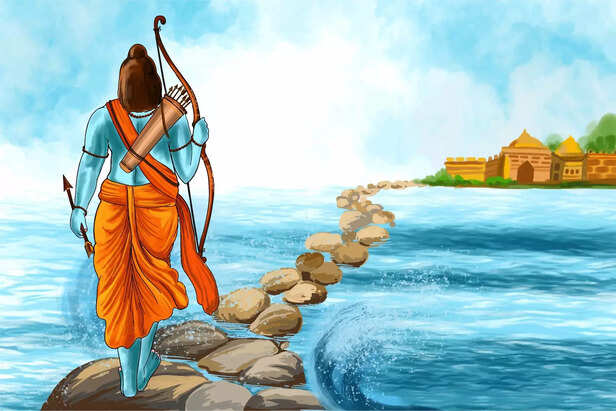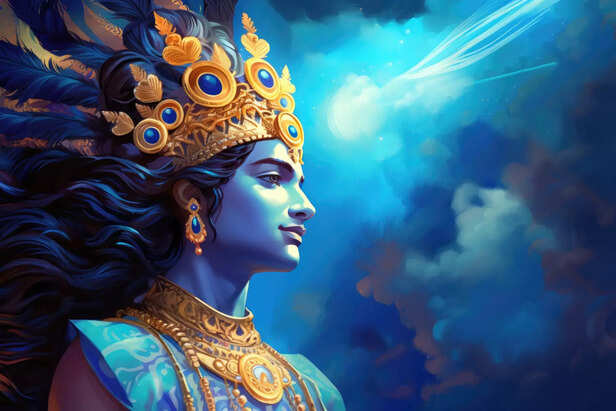The Gita’s Secret to Peace in the Age of Chaos
Kaushal | Oct 28, 2025, 05:30 IST
Lesson
( Image credit : Freepik )
Modern life presents daily battles. The Bhagavad Gita offers timeless wisdom for inner peace. Lord Krishna's teachings emphasize facing challenges with calm, focusing on your actions, not results. Training your mind and discovering your purpose are key. Peace is not an escape but an internal state, accessible through mindful living and self-awareness.
Let’s be honest most of us aren’t fighting wars like Arjuna.Our battlefields are group chats, office deadlines, and overthinking at 2 AM. We scroll through motivational quotes, watch “peace of mind” reels, but still feel restless. The truth? We’ve all forgotten one timeless truth that Lord Krishna told Arjuna thousands of years ago: “Peace doesn’t come from escape, it comes from clarity.” The Bhagavad Gita isn’t a scripture for temples. It’s a handbook for everyday life, especially when your mind feels like a mess.

When something goes wrong an argument, a rejection, or a failure, our first reaction is to escape. But Krishna’s advice to Arjuna was the opposite: “Face it with calmness, not fear.” Try this in real life: Don’t rush to reply when angry. Breathe first. Observe your emotions like a third person “Oh, I’m feeling jealous,” instead of “I am jealous.” Every time you pause before reacting, you win half the battle inside.
Lesson: The Gita isn’t about avoiding problems. It’s about facing them with emotional control.

One of the hardest teachings in the Gita is this: “You have the right to your actions, but not to the results.” We obsess over outcomes grades, likes, promotions—and when things don’t go our way, we collapse. Krishna’s message is simple: You can control your effort, not the outcome.
How to apply this today:

Overthinking, jealousy, anxiety these are modern forms of Arjuna’s confusion.
Krishna said, “The mind can be your best friend or your worst enemy.”
Here’s how to make it your friend:

We often say, “I feel lost” or “I don’t know what to do with my life.”
Arjuna felt the same before Krishna reminded him of his dharma his role, his purpose. Your dharma isn’t a big spiritual mystery. It’s simply doing what feels right and responsible in your stage of life.

You don’t need to read all 700 verses. Just practice these small habits:
1. Start your day with gratitude instead of your phone.
2. When something goes wrong, ask: “What can I control right now?”
3. Spend 10 minutes in silence daily—just breathing or reflecting.
4. Do at least one act without expecting anything in return.
Over time, this becomes your modern Gita lifestyle peaceful, mindful, and purpose driven.
The Gita doesn’t promise a life without struggle. It teaches you how to stay centered during the struggle. Peace isn’t a destination. It’s how you move through chaos. You don’t need to escape the world to find peace. You just need to look inward because that’s where Krishna always spoke from.
Stop Running, Start Responding

Be Calm
( Image credit : Freepik )
When something goes wrong an argument, a rejection, or a failure, our first reaction is to escape. But Krishna’s advice to Arjuna was the opposite: “Face it with calmness, not fear.” Try this in real life: Don’t rush to reply when angry. Breathe first. Observe your emotions like a third person “Oh, I’m feeling jealous,” instead of “I am jealous.” Every time you pause before reacting, you win half the battle inside.
Lesson: The Gita isn’t about avoiding problems. It’s about facing them with emotional control.
Do Your Best, Then Let It Go

Meditation
( Image credit : Freepik )
One of the hardest teachings in the Gita is this: “You have the right to your actions, but not to the results.” We obsess over outcomes grades, likes, promotions—and when things don’t go our way, we collapse. Krishna’s message is simple: You can control your effort, not the outcome.
How to apply this today:
- Study or work because it’s your responsibility, not to impress others.
- Post your art, your thoughts, your content not for validation, but for expression.
- After giving your 100%, stop replaying “what ifs.”
Your Mind Is the Real Battlefield

Reality
( Image credit : Freepik )
Overthinking, jealousy, anxiety these are modern forms of Arjuna’s confusion.
Krishna said, “The mind can be your best friend or your worst enemy.”
Here’s how to make it your friend:
- Feed it good content (read more, scroll less).
- Declutter your thoughts journal for 10 minutes daily.
- Meditate or just sit quietly for 5 minutes a day.
Discover Your Dharma (Purpose)

Dharma
( Image credit : Freepik )
We often say, “I feel lost” or “I don’t know what to do with my life.”
Arjuna felt the same before Krishna reminded him of his dharma his role, his purpose. Your dharma isn’t a big spiritual mystery. It’s simply doing what feels right and responsible in your stage of life.
- For example: As a student: learn with curiosity, not just for marks.
- As a creator: express truthfully, not for trends.
- As a friend or child: show up for people without expectation.
How to Use Gita Wisdom Daily

Geeta
( Image credit : Freepik )
You don’t need to read all 700 verses. Just practice these small habits:
1. Start your day with gratitude instead of your phone.
2. When something goes wrong, ask: “What can I control right now?”
3. Spend 10 minutes in silence daily—just breathing or reflecting.
4. Do at least one act without expecting anything in return.
Over time, this becomes your modern Gita lifestyle peaceful, mindful, and purpose driven.
Conclusion: Peace Is Already Inside You
Frequently Asked Questions [FAQs]
- Can the Gita really help reduce stress?
Yes. Its teachings on detachment and self-control directly reduce overthinking and anxiety. - How can I start applying the Gita in my daily life?
Start small—be honest in your actions, calm in reactions, and focused on effort, not outcomes. - Is detachment the same as not caring?
No. Detachment means caring without losing your emotional balance. - How does the Gita help with modern problems like burnout or comparison?
It reminds us that inner peace comes from clarity and balance, not from competing or chasing results. - Do I need to be religious to learn from the Gita?
Not at all. The Gita’s wisdom is universal—it’s about mindset, not religion.
